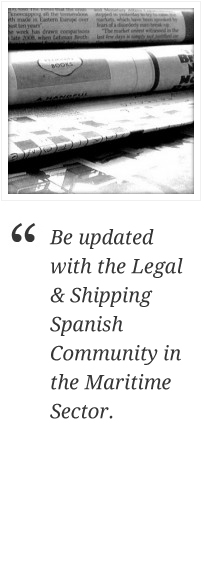Circular 1A / 2013 – July
IMPLEMENTATION OF THE MARITIME LABOUR CONVENTION (MLC) 2006 BY SPAIN
The MLC 2006 will come into force on 20th August 2013. This Convention amends and consolidates 36 existing ILO Conventions and 1 existing Protocol and aims at ensuring minimum working and living conditions of seafarers of all commercial vessels of over 500 gross registered tons trading internationally.
Spain is a signatory state of the MLC 2006 and is taking the necessary measures to implement such convention as a Flag State and as a Port State Member of the Paris MoU.
As a Flag State, the General Directorate of Merchant Marine (GDMM) is the “Competent Authority†for the issue of the “Declaration of Maritime Compliance I†and the “Maritime Labour Certificateâ€. This last certificate is subject to the prior issue of a binding report by the Spanish Labour and Social Security Institute and the Marine Social Institute (MSI) within the areas that are of their competence.
Spanish Owners will also have to issue the “Declaration of Maritime Compliance II†in which they will expose the measures to be adopted for the implementation of the MLC 2006.
Work meetings have been held between representatives from the GDMM, the Spanish Labour and Social Security Institute, the Marine Social Institute and Spanish Ship Owners Association (ANAVE), in order to establish guidelines for the Spanish Ship Owners to correctly implement the MLC 2006. The aim of the GDMM is for the Spanish flagged vessels to have the certificates in force before 20th August 2013.
In this sense, the first inspection of a Spanish flagged vessel took place on 4th May last in the Bay of Algeciras. The inspection team was conducted by the HM of Algeciras and was composed of Labor Inspectors, Medical Inspectors from the MSI. Also present were representatives from the Spanish Shipowner and ANAVE. The result of the inspection was positive.
The GDMM issued an order on 18th April 2013, wherein it defines and determines the application of the terms “vesselâ€, “seafarer†and “sheltered waters†and also establishes that the Paris MoU Inspectors are competent Inspectors to carry out the control inspections by Spain as Port State.
For the enforcement of the MLC 2006 by Spain as a Port State member of the Paris MoU, the GDMM has also presented last May a series of guidelines for the Paris MoU Inspectors at Spanish Ports.
Paris MoU Inspectors should consider the “Transition Period†adopted by the Resolution XVII on 22nd February 2006, which allows the vessels to continue operating without the required declaration and certificates (“Declaration of Maritime Compliance I & II†and a “Maritime Labour Certificateâ€) provided always that there is no evidence of infraction. As from 20th August 2014, any vessel that does not have the declaration and certificates, will be exposed to being detained.
During an Initial Inspection, besides verifying if the vessel has the declaration and certificates, further documentation will be reviewed by the Paris MoU Inspector, as well as a general visit to the vessel. A more detailed inspection will be carried out when the conditions of life and work on board can be a risk to security, health or seafarer’s protection or when the Paris MoU Inspector has reasonable grounds to consider that the requirements of the Convention are not being conformed to or when there are “clear grounds†that the MLC 2006 is being infringed. It is important to note that the Paris MoU Inspector can proceed to consult the competent labour authority on shore in case their advice is necessary.
These “clear grounds†would be the non availability of the required documents, if they are false or non valid or if they do not contain the required information by the MLC 2006. The existence of a claim regarding the life and work conditions on board or the follow up of a “On Shore seafarer complaint†are also considered as “clear groundsâ€.
“On Shore seafarer complaint†is when seafarers have claims regarding life and work conditions on board that were not duly resolved by the company’s internal procedures, and the seafarers proceed to present their claim to the Port State Control Authority at the port.
When severe or reiterative infractions are found on board, the vessel will be detained until the deficiencies are rectified or a plan of action to rectify such deficiencies has been accepted. The implementation of the plan of action is a joint responsibility of the ship owner and captain of the vessel and should be presented for formal approval to the Flag State before its presentation to the Paris MoU Inspector.
It has been mentioned that the vessels that do not comply with the MLC 2006 could face not only detention by the Paris MoU, but also sanctions which we understand would be established within the Spanish Administrative Sanctioning Procedure that could be initiated. It would be interesting to see the practical implementation of such Convention by the Spanish Port Authorities in this sense.

